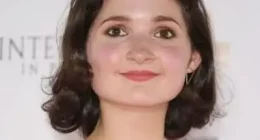
There’s something familiar about Bird Box Barcelona. And that’s by design. The Spanish-language post-apocalyptic horror movie, directed by Alex and David Pastor (The Last Days), which goes out on Netflix worldwide on Friday, is set in the same “fictional universe” as the original Bird Box, directed by Susanne Bier and starring Sandra Bullock, that was a surprise global hit for Netflix back in 2018.
The action of Bird Box Barcelona is set in the Catalan capital instead of California, and in place of Bullock, it features a mixed Latino and European cast, including Spanish star Mario Casas, Babylon’s Diego Calva and Georgina Campbell from Barbarian, but fans of the original (based on Josh Malerman’s 2014 novel) will recognize the premise: The world has been invaded by mysterious entities that, if looked at directly, drive the viewer to die by suicide. Cue a group of rag-tag, blindfolded survivors trying to shepherd their family to safety.
“We knew it was critical to maintain the elements of our universe that are iconic: the blindfolds, the mythology of the creatures, the idea of a world in which seeing is the most dangerous thing you can do,” says Chris Morgan, one of the lead producers on both the original Bird Box and its Spanish spin-off. “As for divergences, we decided to ignore the familiar and explore what was going on at the other side of the world at the same time as the events unfolded in the original film. How would the people of a different country, a different culture, react to the same event?”
Bird Box Barcelona is familiar for another reason as well. It’s the latest example of Netflix’s strategy of trying to stretch the appeal of its popular shows by giving them an international extension. Zack Snyder’s zombie fest Army of the Dead spawned the German feature Army of Thieves. Spanish hit Money Heist got an Asian remake, Money Heist: Korea, as well as an upcoming Spanish-language prequel, Berlin. Criminal: UK, a procedural from Lupin creator George Kay, has been remade for the German, French and Spanish-language markets. The streamer is even trying to take franchises across formats, giving Korean hit Squid Game a shiny-floor spin-off with the similarily-themed (but thankfully non-lethal) game show spin-off Squid Game the Challenge.
“I believe that we as Netflix can offer a nuanced way of adapting titles across formats and languages given we have great local content teams and great teams working across genres – films, series, nonfiction etc,” says Teresa Moneo, director of European Studio Film at Netflix.
Netflix’s global reach might be its USP, or unique selling point, but there’s nothing new about remaking hit shows for the international market. ABC’s Desperate Housewives was given several international versions, including Amas de Casa Desesperadas in Argentina and Umutsuz Ev Kadınları in Turkey. Israeli series BeTipul spawned more than a dozen international spin-offs, most famously HBO’s In Treatment, and Gideon Raff-created Hatufim, or Prisoners of War, became Showtime’s Homeland, P.O.W. – Bandi Yuddh Ke in India and Rodina in Russia.
“The advantages [of doing an international spin-off] are numerous,” says Morgan. “From an audience perspective, international extensions allow viewers to experience new wish-fulfilling places and cultures that they haven’t already seen in films a million times, [and] from a marketing perspective, having a strong, successful, worldwide IP to anchor subsequent chapters around the world is definitely a confidence booster [for the platform].”
What is new(ish) for Netflix, is its focus on the local audience. As overall user growth has slowed, a result of nearing the saturation point in many markets, the company has shifted emphasis from gaining new subscribers to holding and engaging the viewers it already has. While the streamer likes to talk up the importance of taking local shows global —the 165 million households worldwide that watched Squid Game, for example — for international shows, performance in their home market has become a primary metric for rating success.
“If you produce a Danish show for Netflix these days, it has to work in Denmark, primarily,” says Peter Bose, CEO of Miso Film, who produced Danish dystopian series Rain for Netflix. “[It used to be] if a show succeeded globally, but didn’t perform that well locally, they would still go into a second season. But now it’s the local domestic market that’s most important.”
“You still want it to be global,” says Dylan Clark, who produced Bird Box and Bird Box Barcelona, “but it has to feel authentic [for a Spanish audience]. That’s why we went to the Pastors because we knew they could get into this place and do it in a way it was staying inside the zone of Bird Box but doing it authentically in Barcelona.”
Bird Box Barcelona, like the original, has drawn mixed reviews from critics but the real test will come as the audience — in Spain and worldwide —gets a look in the coming days.
“I’m a superstitious producer but if people like this movie, which I think it’s very good, my hope is that we can go explore different cities and different languages in the world of Bird Box,” says Clark. “You know, we can go to the next place and find out what are the people in Asia doing? What are the people in South America doing? We can really tap into different cultures, around the world. Which is pretty cool.”
Source: Hollywood








